
The corridors of power in India witnessed unprecedented turmoil during the recently concluded winter session of the parliament. The session saw an impressive 70 percent functioning of both houses, but it was overshadowed by an extraordinary turn of events.
As members of the opposition parties were demanding answers about a recent security breach, the ruling Bharatiya Janata Party (BJP) pushed through three significant bills that fundamentally altered the country's criminal justice system, media surveillance laws, and the functioning of the election commission.
All these important legislations, that will touch the lives of over a billions people, were approved in the absence of opposition benches. Because, in a shocking move, a total of 146 lawmakers were suspended from both houses of the parliament, accounting for approximately 19 percent of members — an unprecedented occurrence in the history of Indian parliamentary democracy.
The opposition's demand for a government statement regarding the security breach, which occurred on December 13, remained unaddressed. Two individuals had leapt into the well of the Lok Sabha from the visitor's gallery, releasing non-poisonous coloured gas canisters and raising concerns about unemployment and human rights violations in Manipur. The government's refusal to acknowledge the incident left the opposition with no option but to protest, resulting in mass suspensions.
Among those suspended were notable figures, such as former United Nations Assistant Secretary-General Shashi Tharoor, renowned for his eloquence and extensive vocabulary; Professor Manoj Kumar Jha, known for his precise and well-researched arguments; and Derek O'Brien, a quizmaster, alongside several senior leaders from various political parties. Congress Party, the largest opposition party in the Lok Sabha, saw 30 out of its 40 MPs suspended.
Former Lok Sabha Secretary-General PDT Achary emphasized the constitutional responsibility of the government to inform the parliament about critical developments and actions taken under Article 75, Clause 3 of the Indian Constitution. In the case of the recent security breach, it was the Ministry of Home Affairs' responsibility to present facts to the house.
When the government failed to address the opposition's demands for discussion and a statement, members resorted to protesting in the well of the house, displaying placards and chanting slogans against the government, ultimately leading to their suspension.
In a shocking move, a total of 146 lawmakers were suspended from both houses of the parliament, accounting for approximately 19 percent of members — an unprecedented occurrence in the history of Indian parliamentary democracy
Achary further clarified that the speaker holds the duty to prompt the government to respond to the house's demands. The speaker must exercise their authority to ensure that the government fulfils its constitutional obligations. While protests in the form of displaying placards and entering the well have been commonplace in the parliament, this time, the treasury bench viewed it as disruptive behaviour.
Rule 375 of the Lok Sabha and Rule 256 of the Rajya Sabha allow the presiding officer to suspend members temporarily in cases of severe disorder. “Suspension as a means to punish an MP raising the matter of public interest, even in a disorderly manner, is unsustainable,” Achary told The Friday Times.
In the current Lok Sabha, nearly every session has seen the suspension of some members for various reasons. However, during Prime Minister Narendra Modi's first term from 2014 to 2019, a total of 81 lawmakers were suspended. This number has now escalated to 216 in the past five years, including the recent suspension of 146 members.
Reflecting on history, in 1989, during Prime Minister Rajiv Gandhi's tenure, 63 lawmakers were suspended during a debate concerning the report on the assassination of former Prime Minister Indira Gandhi. Rajiv Gandhi was facing allegations of involvement in a defence scam and a resurgent opposition at the time.
Since then, suspensions have been infrequent, with no members suspended from the house despite coalition governments. Achary recalled that former Speaker Somnath Chatterjee was staunchly against suspending MPs, believing it diminished the government's stature and undermined peace.
The government anticipated strong resistance when replacing three crucial laws: The Indian Penal Code, 1860; the Code of Criminal Procedure, 1973; and The Indian Evidence Act. In the absence of opposition, these three bills were debated for over nine and a half hours in the Lok Sabha and six hours in the Rajya Sabha. With representation from 37 political parties in the Lok Sabha, only 34 members participated in the discussion, with 25 belonging to the BJP. In the Rajya Sabha, out of 40 participants, 30 were from the BJP.
The mass suspensions have raised serious questions about the state of Indian democracy, specifically concerning tolerance, respect, and courtesy among fellow parliamentarians. Disrupting the parliament and hindering democratic deliberation has become disturbingly normalised over the past three decades. “The larger problem with the political class is that they lack constitutional morality, which can be seen across parties,” explained Professor Hilal Ahmed of the Centre for the Study of Developing Societies (CSDS).
Ironically, the lawmakers who were supposed to address this issue were seen metaphorically "lynching" the young man who had entered the well of the house with a gas canister. This incident reflects the current social and political culture, where pressing issues of social, political, and economic justice are often sidelined, and the opposition, to conceal its intellectual shortcomings, mimics those in power.
As Achary aptly summarized, "Amidst the differences, there is a skewed balance in the house, and the chair must exercise its authority to maintain and restore that balance. Such suspensions can hardly be conducive to the functioning of the parliament."
These extraordinary events during the winter session serve as a stark reminder of the challenges that Indian democracy faces in the 21st century.

